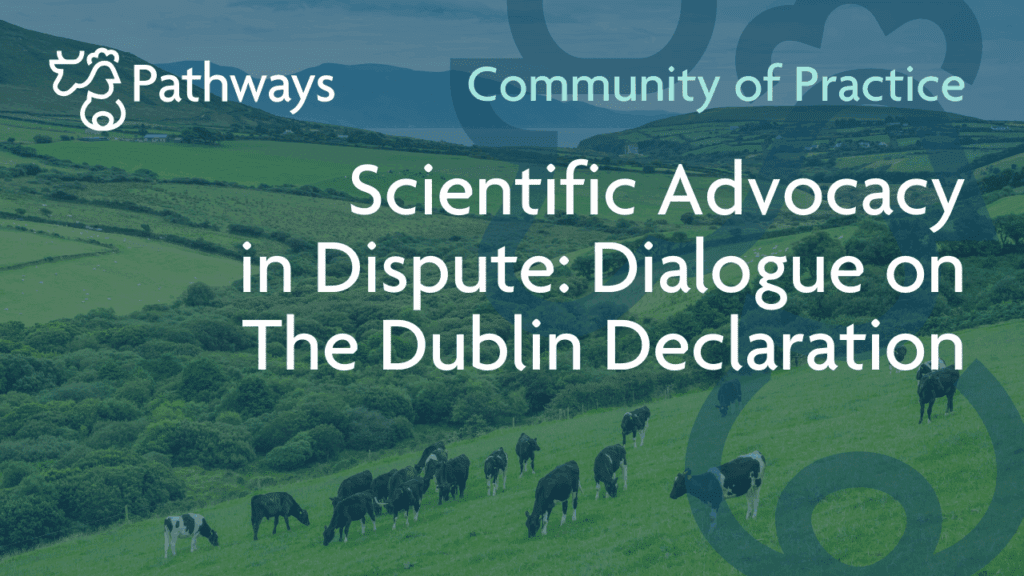Disclaimer:
The discussion reflected differing interpretations of the evidence regarding the need for production reduction. The full recording is available for viewers to interpret in their own context.
On October 9th, PATHWAYS hosted a thought-provoking webinar titled “Scientific Advocacy in Dispute: Dialogue on The Dublin Declaration”. The event brought together leading voices to debate the credibility and implications of the 2022 Dublin Declaration—a document signed by over 1,000 scientists defending the nutritional and societal value of animal-source foods.
The Declaration, which champions meat, dairy, and eggs as essential components of human diets, was enacted as a counterweight to growing calls for reducing animal agriculture due to environmental and health concerns. However, it has drawn sharp criticism from parts of the scientific community, who argue it lacks transparency, relies on selective evidence, and serves as a lobbying tool for industry interests.
To unpack these tensions, the webinar featured Prof. Frédéric Leroy, co-author of the Declaration and food scientist, alongside Dr. Irina Herzon, senior lecturer, sustainability expert, and published critic of the document. The discussion, moderated by journalist Bárbara Machado, explored contrasting visions and the intersection of science and advocacy in shaping the future of livestock systems.
Livestock’s role in nutrition and society
Prof. Leroy defended the Declaration’s intent, stating it was a response to “disproportionate anti-livestock sentiment in public discourse.” He emphasised the nutritional importance of animal-source foods, noting, “We find that the regular consumption of meat, dairy and eggs, and you could add fish, as part of well-balanced and well-formulated diets, are advantageous for human beings.”
He cautioned against oversimplified narratives that vilify meat: “We should be careful when we vilify meat, because we’re vilifying a very nutritious source of food…We take it too much for granted that we can just replace it easily with other foods. We can, but it takes knowledge, skill, resources, and depends a lot on personal needs.”
While advocating for livestock’s value, Prof. Leroy acknowledged the need for reform: “We are not saying that livestock systems get a free pass…We do acknowledge the improvements that are needed.”
Sustainability: downsizing vs. optimisation
Dr. Herzon challenged the Declaration’s core message, arguing that it misleads the public by downplaying the environmental costs of livestock. “The Dublin Declaration gives a message to people that reducing animal consumption or production is not necessary or even helpful to sufficiently limit the environmental impact of the whole system,” she said.
According to Dr. Herzon, the science is clear: “The best evidence we have and robust models” point that “reduction of the livestock is the only way we realistically can have it sustainably in our food systems…We need to both improve and downsize, and without downsizing we cannot improve.”
She added that only a small fraction of meat comes from pastoral systems, and even fewer contribute positively to biodiversity or carbon sequestration: “Only like 10% of meat comes from pastoral systems and only a minor percentage of that is good for biodiversity or sequesters enough carbon to offset emissions.”
Prof. Leroy remained unconvinced, stressing that scientific numbers are not clear yet on the need to reduce production, whilst noting, however, that the goal should be “best practices,” even if that leads to changes in production systems and availability.
Evidence, tools, and the path forward
Despite their differences, both experts agreed on the urgent need for more scientific evidence and a diverse set of tools to guide sustainable transformation.
“We have to be able to measure sustainability,” Dr. Herzon emphasised, pointing to the importance of quantifying the impacts and outputs of agroecological and organic systems, to assess whether these can produce enough to fulfil global feeding needs, and if they help us reach sustainability goals.
She also called for comprehensive data across multiple domains: “We need more evidence, quite urgently, on dietary change, greenhouse gas intensity, nutrient management, feed efficiency, crop productivity. It’s not anymore like one solution is possible to achieve (change). And again, alternative protein sources, are absolutely essential.”
Prof. Leroy echoed the call for broader scientific exploration: “There are a lot of possibilities that are still either not on the radar, have been neglected, or have been ignored.” Different “scenarios that are both very productive and sustainable.”
He highlighted underutilised techniques for sustainable intensification and also techniques on extensive systems that could be upgraded, such as multi-paddock grazing.
“There are ways of producing that are not always acknowledged very well in those kinds of models, and they would require fundamental change.”
Finding common ground
While the debate revealed deep divisions—particularly on whether livestock production should be downsized—there was consensus on the need for improvements and scientific rigor. Both speakers agreed that no single solution fits all contexts and that a “complete toolbox” is essential to address the complex challenges of nutrition, sustainability, and climate impact.
As the webinar concluded, it was clear that the future of livestock policy will depend not only on scientific evidence but also on open scientific debate, to successfully shape a path toward more sustainable food systems.
Watch the webinar recording below:
